| Reviews & Columns |
|
Reviews DVD TV on DVD Blu-ray 4K UHD International DVDs In Theaters Reviews by Studio Video Games Features Collector Series DVDs Easter Egg Database Interviews DVD Talk Radio Feature Articles Columns Anime Talk DVD Savant Horror DVDs The M.O.D. Squad Art House HD Talk Silent DVD
|
DVD Talk Forum |
|
|
| Resources |
|
DVD Price Search Customer Service #'s RCE Info Links |
|
Columns
|
|
|
Duellists, The
Shout Factory // PG // January 29, 2013
List Price: $19.97 [Buy now and save at Amazon]
The Film:
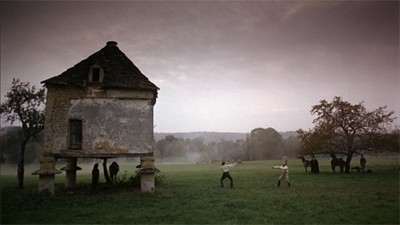 The Duellists' path to realization is an easy and logical one to follow: after thumbing through public-domain material to adapt and landing on a Joseph Conrad short story, Ridley Scott -- then an experienced commercial director -- took around a million dollars to emulate the tone and visual style of Stanley Kubrick's Barry Lyndon but with his own, distinctive outlook. He made the most of every penny by relying on impressive on-location structures, hiring the right actors, and concentrating on the accuracy of costumes and fighting maneuvers for his Napoleonic-era depiction of two soldiers' duels across the French countryside, taking place over several decades. Surprisingly, what Scott ended up with in his first feature film remains one of his most versatile and time-withstanding pieces of work: an enthralling assessment of both the import and vainness of honor amongst men that's heightened by staunch adherence to historical precision, and an early expression of the visual storyteller's ingenuity.
The Duellists' path to realization is an easy and logical one to follow: after thumbing through public-domain material to adapt and landing on a Joseph Conrad short story, Ridley Scott -- then an experienced commercial director -- took around a million dollars to emulate the tone and visual style of Stanley Kubrick's Barry Lyndon but with his own, distinctive outlook. He made the most of every penny by relying on impressive on-location structures, hiring the right actors, and concentrating on the accuracy of costumes and fighting maneuvers for his Napoleonic-era depiction of two soldiers' duels across the French countryside, taking place over several decades. Surprisingly, what Scott ended up with in his first feature film remains one of his most versatile and time-withstanding pieces of work: an enthralling assessment of both the import and vainness of honor amongst men that's heightened by staunch adherence to historical precision, and an early expression of the visual storyteller's ingenuity.
Joseph Conrad's story has roots in true events about two French soldiers, whose rivalry spurned from a hot-headed duelist's challenge to his prominent comrade for delivering a message he didn't find favorable. As expanded upon in Scott's film, the message was over a lopsided duel instigated by Lieutenant Gabriel Feraud (Harvey Keitel) that nearly killed a family member of the mayor of Strasbourg, and the reprimand delivered to Feraud by Lieutenant Armand d'Hubert (Keith Carradine). This simple act, coupled with Feraud's thirst for swordsmanship and quick-tempered judgment against d'Hubert, leads to a series of duels spanning fifteen years in the early 1800s and between several different European battles, with the two soldiers scaling military ranks at a nearly-even pace. With every new station and every battle fought, however, the rivalry -- one that becomes storied among soldiers and townsfolk -- perseveres; not over what caused it, but for the pure back-and-forth damage to their honor that results.
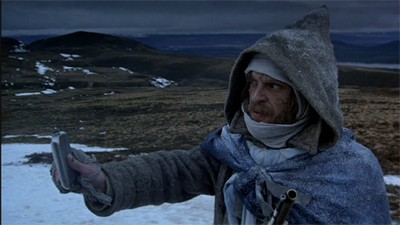 Significant events happen around Feraud and d'Hubert, bookended by the rise and fall of Napoleon's reign in itself, but Gerald Vaughan-Hughes' screenplay for The Duellists revolves about the physical and mental duel itself, and how it impacts those around them. That tunnel-vision focus on their contention emphasizes an intentional subtext: as major events occur, changing the face of their country and the ones they love, a petty war of personal dominance -- instigated by Feraud, tolerated or avoided by d'Hubert -- remains a central feature as they grow into weathered, prominent officers of disparate dogmas. Obviously, their prowess over one another doesn't directly determine their importance outside the duel, but it endures so long as Feraud's ideal of honor feels threatened by the actions of d'Hubert. Vaughn-Hughes' dialogue, bolstered by Scott's keen eye for the versatile morality of his characters, renders this obsessive tug-of-war into an intriguing challenge of the psyche and spirit of men.
Significant events happen around Feraud and d'Hubert, bookended by the rise and fall of Napoleon's reign in itself, but Gerald Vaughan-Hughes' screenplay for The Duellists revolves about the physical and mental duel itself, and how it impacts those around them. That tunnel-vision focus on their contention emphasizes an intentional subtext: as major events occur, changing the face of their country and the ones they love, a petty war of personal dominance -- instigated by Feraud, tolerated or avoided by d'Hubert -- remains a central feature as they grow into weathered, prominent officers of disparate dogmas. Obviously, their prowess over one another doesn't directly determine their importance outside the duel, but it endures so long as Feraud's ideal of honor feels threatened by the actions of d'Hubert. Vaughn-Hughes' dialogue, bolstered by Scott's keen eye for the versatile morality of his characters, renders this obsessive tug-of-war into an intriguing challenge of the psyche and spirit of men.
The duel scenes themselves aren't elegant displays. Gorgeously photographed by Frank Tidy against rich location shots that feature breathtaking weathered structures across the French countryside (and other locations), these aren't fights featuring mythical duelists, but flawed men embodying the role of opponents. Despite proper fencing stances and occasional grace given authenticity by the guidance of fight choreographer William Hobbs, they're full of missteps, blood, and self-doubt that nail down the veracity of how they play out. The collective choice between Scott and his actors to use heavy steel sabres instead of quicker parrying rapiers, a tactic to stay relevant to the era, gives those scenes weight, where the clang of those blades and how it impacts the actors' movement enhance the power, danger, and exhaustion intended. These are observable precursors to the visceral force Scott conveys within his more successful films, and they're impressively enhanced by straightforward, budget-minded decisions.
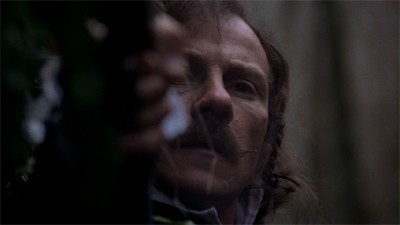 Director Scott allows The Duellists to dig into a psychological space by navigating those fundamental differences between the duelists themselves, and how they reflect on the different sides of those that cross swords. Possessing a vague history outside of being a commoner-turned-soldier who fought his way up, Feraud's bloodlust and unquenchable desire to conquer shape him into a browbeater custom-made for the duel; Harvey Keitel's intense presence, with the fiery spirit he brought to Martin Scorsese's earlier work, emboldens that perspective. Conversely, d'Hubert possesses aristocratic roots and graduallt progresses towards an obligated fixation on his opponent, and how the bind to honor intrudes on his life's impetus; Keith Carradine's projects easy charm and burdened rigidness through those traits. Both allow the duel to consume parts of them in different ways -- one shackled by his own fury, the other avoiding or preparing for the ongoing conflict -- and Scott relishes that obsession as the world progresses around them.
Director Scott allows The Duellists to dig into a psychological space by navigating those fundamental differences between the duelists themselves, and how they reflect on the different sides of those that cross swords. Possessing a vague history outside of being a commoner-turned-soldier who fought his way up, Feraud's bloodlust and unquenchable desire to conquer shape him into a browbeater custom-made for the duel; Harvey Keitel's intense presence, with the fiery spirit he brought to Martin Scorsese's earlier work, emboldens that perspective. Conversely, d'Hubert possesses aristocratic roots and graduallt progresses towards an obligated fixation on his opponent, and how the bind to honor intrudes on his life's impetus; Keith Carradine's projects easy charm and burdened rigidness through those traits. Both allow the duel to consume parts of them in different ways -- one shackled by his own fury, the other avoiding or preparing for the ongoing conflict -- and Scott relishes that obsession as the world progresses around them.
And progress it does. The Duellists' scope allows their rivalry to crop up under different contexts of the men's lives, especially concerned with d'Hubert's struggle to cope with his constant squabble with Feraud alongside his military and romantic endeavors, featuring a sensual, wonderful performance from Diana Quick as his lover at arm's length, Laura. Surprisingly, by way of Scott's direction, this depiction harnesses an everlasting property when contained by the two men's obfuscated perception of honor, where its rich visual presence commands a specific tone as they trade blows in foggy forests, sun-drenched stone alcoves, and ultimately a breathtaking sprawl of damp, fiddly ruins. This is a sensory piece of filmmaking, there's no denying that, where drenched blood and sweaty, stern-eyed glances convey the mannered evolution of these duelists with every instance they survive yet another encounter. They're different men every time, yet they can't seem to pry themselves from this habitual internal war they've lost perspective of over the years.
The Blu-ray:
Shout Factory haven unsheathed The Duellists on Blu-ray, presented in a standard blue case with standard front artwork that closely mirrors Paramount's 2002 DVD presentation. At least, it appears to at first glance: you'll discover that the artwork is actually two-sided once you crack the packaging open, the alternate artwork featuring the brownish-sepia vintage poster artwork (shown above). Naturally, the retail packaging will not feature the review-copy holes in the pictures where the barcode appears, so the much-preferred artwork will be seamless.
Video and Audio:
It's hard not to lump explicit praise on Shout Factory for bringing films to the high-definition arena that might've not in other circumstances, and doing so with a capable eye for quality. The Duellists presents yet another example of this, despite a few recurring issues which seem to source from the available masters: while the 1.78:1-framed, AVC-encoded 1080p treatment bring Frank Tidy's cinematography and Ridley Scott's composition to vivid life, it's not without noticeable print dust and blips and general restraint on fine detail. With those things in mind, it's a beautiful transfer; the emerald depths of lush countryside, the gruff texture of weatherworn buildings, and the contrast shifts against elegant skin-tones and detailed garments all reveal the photography's exhaustive composition through a reputable veil of grain. Some could easily take issue with the intrusion of detail in the shadow's black levels, even considering the fact that Scott and Tidy intentionally played with that kind of lighting, but otherwise the contrast here remains balanced and rather impressive. Altogether, The Duellists looks exquisite.
Less-satisfying but otherwise quite suitable when considering the source and age, a pair of Master Audio tracks -- one a 5.1 offering, the other a 2-channel -- respect both the original recording intentions and the desire for a versatile surround track. Both offerings support the throaty, metallic clank of blades, some of which travel to the rear-channel space in the surround presentation, while the general presence of dialogue remains moderately clear and aware of the scenes' environments: the bustle of taverns, the stillness of chambers, and the openness of the French countryside. This is one of those aural tracks that only reveals its age when it attempts to overexert itself; quieter scenes are extremely smooth and show few issues, but harder-hitting effects -- while possessing punch -- occasionally strain their clarity and stability. By and large, though, it's a rather well-done treatment for a pennies-on-the-dollar independent film from the '70s, despite a few flaws.
Special Features:
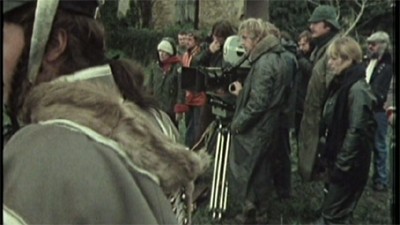 Enthusiasts of the film are certain to be centrally interested in the new Interview with Keith Carradine (24:59, HD/SD) among the slate of familiar supplements, recorded by Shot Factory in 2012, and I'm happy to report that it's pretty darn fantastic. As one can pick up from any of his interviews (or his starring roles, in fact), he's an incisive and well-spoken veteran to the craft with a wealth of knowledge about what he does. Something that might surprise those watching, though, his awareness and excitement over The Duellists' accuracy, endurance, and presence as Scott's feature film. Sure, a lot of the material discussed retreads the things you can hear in Scott's commentary, but he also offers his own added input about historical pertinence and the skill it requires to do this film on such a small budget, as well as the film's stature as a cult classic. In-depth and exceptionally interesting.
Enthusiasts of the film are certain to be centrally interested in the new Interview with Keith Carradine (24:59, HD/SD) among the slate of familiar supplements, recorded by Shot Factory in 2012, and I'm happy to report that it's pretty darn fantastic. As one can pick up from any of his interviews (or his starring roles, in fact), he's an incisive and well-spoken veteran to the craft with a wealth of knowledge about what he does. Something that might surprise those watching, though, his awareness and excitement over The Duellists' accuracy, endurance, and presence as Scott's feature film. Sure, a lot of the material discussed retreads the things you can hear in Scott's commentary, but he also offers his own added input about historical pertinence and the skill it requires to do this film on such a small budget, as well as the film's stature as a cult classic. In-depth and exceptionally interesting.
The rest of the supplements have been carried over from Paramount's 2002 Special Edition DVD for The Duellists, but one might potentially forget the quality of those already available. This includes a pair of commentaries; the Commentary with Ridley Scott doesn't really need to be redone or spruced up, because it's a substantial, modest exploration with the director that addresses historical accuracy, production design, the actors, the photography, and other elements; and, thankfully, along with that, the Isolated Score with Commentary by Howard Blake also makes a second appearance. Rounding out the content-based features is the Duelling Directors (29:09, SD) interview between Kevin Reynolds and Ridley Scott (and writer Gerald Vaughn-Hughes, through outer clips) where the two discuss specific scenes and tactics employed -- the "out-of-place" horse duel, the inventive lighting, Scott's projects still on the shelf, the swords -- in an exuberant but unpretentious discussion.
It's unfortunate that the Storyboards / Photo Gallery or the Theatrical Trailer haven't been included (or Scott's short film, "Boy and Bicycle"), but everything new and returning -- including nearly an hour of interview content -- comes together into quite a satisfying package.
Final Thoughts:
The visual richness, the conflict built around honor and obsession, and the pragmatic allure of the duels themselves remains exceedingly impressive in Ridley Scott's premiere feature, The Duellists, to a degree where you don't even have to take into account that it was made on a marginal indie-film budget. Based on a short story about two French officers with different motivations for persevering with their rivalry, this glimpse at warring, evolving duelists within the space of Napoleon's reign tells their tale of construed conflict through deliberate aesthetic techniques, serving as narrative devices and crucial evocative mood-setters around brisk fights and pensive moments in between. Within Frank Tidy's cinematography and Howard Blake's music, Scott weaves the two men's adjoined pathos into an eloquent expression, a rugged poem of manner and violence that grows more interesting as time continues to make the film's overarching point relevant.
Shout Factory's Blu-ray is quite satisfying, boasting slightly-flawed but entrancing audiovisual properties and an exquisite new interview with Keith Carradine to accompany the old special features already available. Very Highly Recommended.
Note: The still in this review are from Paramount's 2002 DVD, and do not represent the quality of the Blu-ray being evaluated here.
Thomas Spurlin, Staff Reviewer -- DVDTalk Reviews | Personal Blog/Site
 The Duellists' path to realization is an easy and logical one to follow: after thumbing through public-domain material to adapt and landing on a Joseph Conrad short story, Ridley Scott -- then an experienced commercial director -- took around a million dollars to emulate the tone and visual style of Stanley Kubrick's Barry Lyndon but with his own, distinctive outlook. He made the most of every penny by relying on impressive on-location structures, hiring the right actors, and concentrating on the accuracy of costumes and fighting maneuvers for his Napoleonic-era depiction of two soldiers' duels across the French countryside, taking place over several decades. Surprisingly, what Scott ended up with in his first feature film remains one of his most versatile and time-withstanding pieces of work: an enthralling assessment of both the import and vainness of honor amongst men that's heightened by staunch adherence to historical precision, and an early expression of the visual storyteller's ingenuity.
The Duellists' path to realization is an easy and logical one to follow: after thumbing through public-domain material to adapt and landing on a Joseph Conrad short story, Ridley Scott -- then an experienced commercial director -- took around a million dollars to emulate the tone and visual style of Stanley Kubrick's Barry Lyndon but with his own, distinctive outlook. He made the most of every penny by relying on impressive on-location structures, hiring the right actors, and concentrating on the accuracy of costumes and fighting maneuvers for his Napoleonic-era depiction of two soldiers' duels across the French countryside, taking place over several decades. Surprisingly, what Scott ended up with in his first feature film remains one of his most versatile and time-withstanding pieces of work: an enthralling assessment of both the import and vainness of honor amongst men that's heightened by staunch adherence to historical precision, and an early expression of the visual storyteller's ingenuity. Joseph Conrad's story has roots in true events about two French soldiers, whose rivalry spurned from a hot-headed duelist's challenge to his prominent comrade for delivering a message he didn't find favorable. As expanded upon in Scott's film, the message was over a lopsided duel instigated by Lieutenant Gabriel Feraud (Harvey Keitel) that nearly killed a family member of the mayor of Strasbourg, and the reprimand delivered to Feraud by Lieutenant Armand d'Hubert (Keith Carradine). This simple act, coupled with Feraud's thirst for swordsmanship and quick-tempered judgment against d'Hubert, leads to a series of duels spanning fifteen years in the early 1800s and between several different European battles, with the two soldiers scaling military ranks at a nearly-even pace. With every new station and every battle fought, however, the rivalry -- one that becomes storied among soldiers and townsfolk -- perseveres; not over what caused it, but for the pure back-and-forth damage to their honor that results.
 Significant events happen around Feraud and d'Hubert, bookended by the rise and fall of Napoleon's reign in itself, but Gerald Vaughan-Hughes' screenplay for The Duellists revolves about the physical and mental duel itself, and how it impacts those around them. That tunnel-vision focus on their contention emphasizes an intentional subtext: as major events occur, changing the face of their country and the ones they love, a petty war of personal dominance -- instigated by Feraud, tolerated or avoided by d'Hubert -- remains a central feature as they grow into weathered, prominent officers of disparate dogmas. Obviously, their prowess over one another doesn't directly determine their importance outside the duel, but it endures so long as Feraud's ideal of honor feels threatened by the actions of d'Hubert. Vaughn-Hughes' dialogue, bolstered by Scott's keen eye for the versatile morality of his characters, renders this obsessive tug-of-war into an intriguing challenge of the psyche and spirit of men.
Significant events happen around Feraud and d'Hubert, bookended by the rise and fall of Napoleon's reign in itself, but Gerald Vaughan-Hughes' screenplay for The Duellists revolves about the physical and mental duel itself, and how it impacts those around them. That tunnel-vision focus on their contention emphasizes an intentional subtext: as major events occur, changing the face of their country and the ones they love, a petty war of personal dominance -- instigated by Feraud, tolerated or avoided by d'Hubert -- remains a central feature as they grow into weathered, prominent officers of disparate dogmas. Obviously, their prowess over one another doesn't directly determine their importance outside the duel, but it endures so long as Feraud's ideal of honor feels threatened by the actions of d'Hubert. Vaughn-Hughes' dialogue, bolstered by Scott's keen eye for the versatile morality of his characters, renders this obsessive tug-of-war into an intriguing challenge of the psyche and spirit of men. The duel scenes themselves aren't elegant displays. Gorgeously photographed by Frank Tidy against rich location shots that feature breathtaking weathered structures across the French countryside (and other locations), these aren't fights featuring mythical duelists, but flawed men embodying the role of opponents. Despite proper fencing stances and occasional grace given authenticity by the guidance of fight choreographer William Hobbs, they're full of missteps, blood, and self-doubt that nail down the veracity of how they play out. The collective choice between Scott and his actors to use heavy steel sabres instead of quicker parrying rapiers, a tactic to stay relevant to the era, gives those scenes weight, where the clang of those blades and how it impacts the actors' movement enhance the power, danger, and exhaustion intended. These are observable precursors to the visceral force Scott conveys within his more successful films, and they're impressively enhanced by straightforward, budget-minded decisions.
 Director Scott allows The Duellists to dig into a psychological space by navigating those fundamental differences between the duelists themselves, and how they reflect on the different sides of those that cross swords. Possessing a vague history outside of being a commoner-turned-soldier who fought his way up, Feraud's bloodlust and unquenchable desire to conquer shape him into a browbeater custom-made for the duel; Harvey Keitel's intense presence, with the fiery spirit he brought to Martin Scorsese's earlier work, emboldens that perspective. Conversely, d'Hubert possesses aristocratic roots and graduallt progresses towards an obligated fixation on his opponent, and how the bind to honor intrudes on his life's impetus; Keith Carradine's projects easy charm and burdened rigidness through those traits. Both allow the duel to consume parts of them in different ways -- one shackled by his own fury, the other avoiding or preparing for the ongoing conflict -- and Scott relishes that obsession as the world progresses around them.
Director Scott allows The Duellists to dig into a psychological space by navigating those fundamental differences between the duelists themselves, and how they reflect on the different sides of those that cross swords. Possessing a vague history outside of being a commoner-turned-soldier who fought his way up, Feraud's bloodlust and unquenchable desire to conquer shape him into a browbeater custom-made for the duel; Harvey Keitel's intense presence, with the fiery spirit he brought to Martin Scorsese's earlier work, emboldens that perspective. Conversely, d'Hubert possesses aristocratic roots and graduallt progresses towards an obligated fixation on his opponent, and how the bind to honor intrudes on his life's impetus; Keith Carradine's projects easy charm and burdened rigidness through those traits. Both allow the duel to consume parts of them in different ways -- one shackled by his own fury, the other avoiding or preparing for the ongoing conflict -- and Scott relishes that obsession as the world progresses around them. And progress it does. The Duellists' scope allows their rivalry to crop up under different contexts of the men's lives, especially concerned with d'Hubert's struggle to cope with his constant squabble with Feraud alongside his military and romantic endeavors, featuring a sensual, wonderful performance from Diana Quick as his lover at arm's length, Laura. Surprisingly, by way of Scott's direction, this depiction harnesses an everlasting property when contained by the two men's obfuscated perception of honor, where its rich visual presence commands a specific tone as they trade blows in foggy forests, sun-drenched stone alcoves, and ultimately a breathtaking sprawl of damp, fiddly ruins. This is a sensory piece of filmmaking, there's no denying that, where drenched blood and sweaty, stern-eyed glances convey the mannered evolution of these duelists with every instance they survive yet another encounter. They're different men every time, yet they can't seem to pry themselves from this habitual internal war they've lost perspective of over the years.
The Blu-ray:
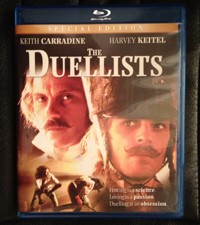 | 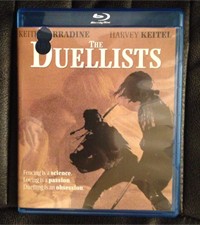 | 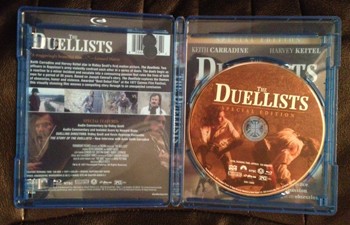 |
Shout Factory haven unsheathed The Duellists on Blu-ray, presented in a standard blue case with standard front artwork that closely mirrors Paramount's 2002 DVD presentation. At least, it appears to at first glance: you'll discover that the artwork is actually two-sided once you crack the packaging open, the alternate artwork featuring the brownish-sepia vintage poster artwork (shown above). Naturally, the retail packaging will not feature the review-copy holes in the pictures where the barcode appears, so the much-preferred artwork will be seamless.
Video and Audio:
It's hard not to lump explicit praise on Shout Factory for bringing films to the high-definition arena that might've not in other circumstances, and doing so with a capable eye for quality. The Duellists presents yet another example of this, despite a few recurring issues which seem to source from the available masters: while the 1.78:1-framed, AVC-encoded 1080p treatment bring Frank Tidy's cinematography and Ridley Scott's composition to vivid life, it's not without noticeable print dust and blips and general restraint on fine detail. With those things in mind, it's a beautiful transfer; the emerald depths of lush countryside, the gruff texture of weatherworn buildings, and the contrast shifts against elegant skin-tones and detailed garments all reveal the photography's exhaustive composition through a reputable veil of grain. Some could easily take issue with the intrusion of detail in the shadow's black levels, even considering the fact that Scott and Tidy intentionally played with that kind of lighting, but otherwise the contrast here remains balanced and rather impressive. Altogether, The Duellists looks exquisite.
Less-satisfying but otherwise quite suitable when considering the source and age, a pair of Master Audio tracks -- one a 5.1 offering, the other a 2-channel -- respect both the original recording intentions and the desire for a versatile surround track. Both offerings support the throaty, metallic clank of blades, some of which travel to the rear-channel space in the surround presentation, while the general presence of dialogue remains moderately clear and aware of the scenes' environments: the bustle of taverns, the stillness of chambers, and the openness of the French countryside. This is one of those aural tracks that only reveals its age when it attempts to overexert itself; quieter scenes are extremely smooth and show few issues, but harder-hitting effects -- while possessing punch -- occasionally strain their clarity and stability. By and large, though, it's a rather well-done treatment for a pennies-on-the-dollar independent film from the '70s, despite a few flaws.
Special Features:
 Enthusiasts of the film are certain to be centrally interested in the new Interview with Keith Carradine (24:59, HD/SD) among the slate of familiar supplements, recorded by Shot Factory in 2012, and I'm happy to report that it's pretty darn fantastic. As one can pick up from any of his interviews (or his starring roles, in fact), he's an incisive and well-spoken veteran to the craft with a wealth of knowledge about what he does. Something that might surprise those watching, though, his awareness and excitement over The Duellists' accuracy, endurance, and presence as Scott's feature film. Sure, a lot of the material discussed retreads the things you can hear in Scott's commentary, but he also offers his own added input about historical pertinence and the skill it requires to do this film on such a small budget, as well as the film's stature as a cult classic. In-depth and exceptionally interesting.
Enthusiasts of the film are certain to be centrally interested in the new Interview with Keith Carradine (24:59, HD/SD) among the slate of familiar supplements, recorded by Shot Factory in 2012, and I'm happy to report that it's pretty darn fantastic. As one can pick up from any of his interviews (or his starring roles, in fact), he's an incisive and well-spoken veteran to the craft with a wealth of knowledge about what he does. Something that might surprise those watching, though, his awareness and excitement over The Duellists' accuracy, endurance, and presence as Scott's feature film. Sure, a lot of the material discussed retreads the things you can hear in Scott's commentary, but he also offers his own added input about historical pertinence and the skill it requires to do this film on such a small budget, as well as the film's stature as a cult classic. In-depth and exceptionally interesting. The rest of the supplements have been carried over from Paramount's 2002 Special Edition DVD for The Duellists, but one might potentially forget the quality of those already available. This includes a pair of commentaries; the Commentary with Ridley Scott doesn't really need to be redone or spruced up, because it's a substantial, modest exploration with the director that addresses historical accuracy, production design, the actors, the photography, and other elements; and, thankfully, along with that, the Isolated Score with Commentary by Howard Blake also makes a second appearance. Rounding out the content-based features is the Duelling Directors (29:09, SD) interview between Kevin Reynolds and Ridley Scott (and writer Gerald Vaughn-Hughes, through outer clips) where the two discuss specific scenes and tactics employed -- the "out-of-place" horse duel, the inventive lighting, Scott's projects still on the shelf, the swords -- in an exuberant but unpretentious discussion.
It's unfortunate that the Storyboards / Photo Gallery or the Theatrical Trailer haven't been included (or Scott's short film, "Boy and Bicycle"), but everything new and returning -- including nearly an hour of interview content -- comes together into quite a satisfying package.
Final Thoughts:
The visual richness, the conflict built around honor and obsession, and the pragmatic allure of the duels themselves remains exceedingly impressive in Ridley Scott's premiere feature, The Duellists, to a degree where you don't even have to take into account that it was made on a marginal indie-film budget. Based on a short story about two French officers with different motivations for persevering with their rivalry, this glimpse at warring, evolving duelists within the space of Napoleon's reign tells their tale of construed conflict through deliberate aesthetic techniques, serving as narrative devices and crucial evocative mood-setters around brisk fights and pensive moments in between. Within Frank Tidy's cinematography and Howard Blake's music, Scott weaves the two men's adjoined pathos into an eloquent expression, a rugged poem of manner and violence that grows more interesting as time continues to make the film's overarching point relevant.
Shout Factory's Blu-ray is quite satisfying, boasting slightly-flawed but entrancing audiovisual properties and an exquisite new interview with Keith Carradine to accompany the old special features already available. Very Highly Recommended.
|
| Popular Reviews |
| Sponsored Links |
|
|
| Sponsored Links |
|
|
| Release List | Reviews | Shop | Newsletter | Forum | DVD Giveaways | Blu-Ray | Advertise |
|
Copyright 2024 DVDTalk.com All Rights Reserved. Legal Info, Privacy Policy, Terms of Use,
Manage Preferences,
Your Privacy Choices | |||||||













